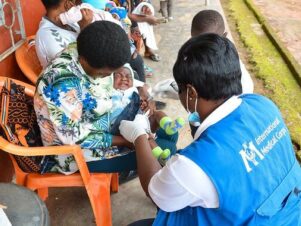What about gonorrhea?
Gonorrhea is caused by a sexually transmitted bacterium that infects both women and men. The throat, rectum, or urethra are mostly affected by this STI. The cervix in women, can also be infected by gonorrhea. Anal, oral, or vaginal intercourse are the most common ways through which gonorrhea is spread.
During delivery, babies born to infected mothers can become infected. Gonorrhea in babies most often affects their eyes. The best ways to prevent sexually transmitted infections is through being in a mutually monogamous relationship, using condoms during sex, and abstinence from sex are.
How is gonorrhea spread?
Penile fluids and vaginal fluids mostly carry the bacteria that cause gonorrhea.
Gonorrhea is transmitted more easily from person to person through:
- Sharing sex toys like vibrators that have not been covered with a new condom or washed after each use
- Anal, oral, or vaginal sex without a condom
The rectum, the tube that carries urine out of the body (urethra), the entrance to the uterus (cervix), and less commonly, the eyes or throat can be affected by the bacteria. The bacterial infection can equally be transmitted from a mother to child. It’s essential to get diagnosed and treated before delivery if you may have gonorrhea in pregnancy.
Gonorrhea in babies can cause permanent blindness without treatment. Swimming, hugging, kissing, sitting on the toilet, or sharing cups, towels, baths, silverware or plates, are not method of gonorrhea transmission. Outside of the human body, the bacteria cannot survive long.
How common is gonorrhea?
Gonorrhea is a very familiar sexually infectious disease. About 1.6 million new gonococcal infections, according to the CDC occurred in 2018 in the United States, with more than half a million occurring in youth ages 15 to 24. The second most common STI in the United States is gonorrhea. However, reported cases represent only a small fraction of the true burden since many infections are asymptomatic.
Who is at risk of contracting gonorrhea?
Gonorrhea can affect any sexually active person. According to a research done by bigmanlab team of STI experts, the highest reported infection rates are among young adults and sexually active adolescents.
What about gonorrhea symptoms and signs?
No symptoms are usually associated with Gonorrhea. This is especially true for females.
Depending on your reproductive organs, if you do have symptoms, they are likely to affect you differently.
Depending on the reproductive structure gonorrhea has varying symptoms.
The symptoms of gonorrhea
Symptoms of gonorrhea in women.
Non-binary, transgender men, and cisgender women people with a vagina, ho are People assigned female at birth often show no gonorrhea symptoms. For this reason, it's important to do a gonorrhea test if you think you may have been exposed.
When present, symptoms may include:
- Periodic bleeding
- Unusual white or yellow vaginal discharge.
- Dyspareunia or Painful intercourse.
- Stomach or lower abdomen or pelvis Pain.
- Pain or burning when urinating (dysuria).
Symptoms of gonorrhea in men.
People identified as male at birth, including non-binary, transgender women, and cisgender men people with penises, are more likely to experience gonorrhea symptoms. However, until several weeks after exposure you may not notice signs of infection, which means you may be infecting your partner without knowing it.
Symptoms are:
- Swollen testicles and Pain in the testicles.
- Green, yellow, or White penis discharge.
- Possibly intense burning or pain when urinating (dysuria).
- Symptoms of gonorrhea in all genders.
Both males and females can get a gonorrhea infection from the rectum (from anal sex) or in the throat (from oral sex on the genitals). This infection types are less common than gonorrhea which affects the sex organs.
Symptoms are:
- Anus: pain during defecation, discharge, itching.
- Throat: difficulty swallowing, scratching, itching and pain (similar to a sore throat).
Gonorrhea causes
When the gonorrhea bacteria (N. gonorrhoeae) enters the body through sexual discharges, such as vaginal secretions or semen, mostly through unprotected sex, you can get infected. Through the anus, vagina, penis, or mouth the bacteria can enter your body. To spread the bacteria, neither you nor your partner need to ejaculate.
By sharing unwashed sex toys not covered with new condoms, you can also spread gonorrhea. The most common site of infection in people designated female at birth is the cervix. The opening between the uterus and vagina is called the cervix is. The infection usually begins in the urethra (urinating tube) in people born male.
What about gonorrhea complications
Serious complications can result from untreated gonorrhea, such as:
Higher risk of AIDS/HIV:
People with gonorrhea are more susceptible to infection with HIV (the human immunodeficiency virus), that causes AIDS. Persons with both HIV and gonorrhea and are more likely to transmit these diseases on to their partners.
Women infertility:
Gonorrhea can spread to the fallopian tubes and uterus and lead to pelvic inflammatory disease. This condition can lead to scarring of the fallopian tubes, infertility and increasing the risk of pregnancy complications. Pelvic inflammatory disease requires immediate treatment.
Baby Complications:
Infections, scalp sores, and blindness can be developed by babies who contract gonorrhea at birth from their mothers.
Men infertility:
Gonorrhea in men can result to inflammation of the small twisted tube at the back of the testicle, where the epididymitis (vas deferens) is located to inflame. If left untreated, it can result to infertility.
General infection:
The infection spreads to the entire body and to joints. The gonorrhea bacteria can spread through the bloodstream and cause infection to other body parts, joints included. Possible consequences include stiffness, skin sores, rash, joint pain, fever, and swelling.
What about Gonorrhea treatment?

In most cases of gonorrhea modern antibiotics are effective for cure. Home or over-the-counter remedies cannot cure gonorrhea. If your sexual partner tests positive or you think you have gonorrhea, then you should get tested immediately and treatment.
Antibiotics:
At bigmanlab the recommended gonorrhea treatment is a single intramuscular antibiotic ceftriaxone injection. Usually a health care provider gives you this shot in the buttocks.
Bigmanlab health care providers may equally prescribe oral medications, like:
- Doxycycline twice a day dose for a duration 7 days.
The gonorrhea bacteria have become increasingly resistant to azithromycin. For this reason the bigmanlab previous recommendation of ceftriaxone plus azithromycin have changed.
Within a few days of taking this antibiotic, you should experience relief from any of your symptoms, but we recommend you only engage in sexual activity a week after finishing the medication. For oral gonorrhea, we recommend you revisit for more checks 1-2 weeks later to ensure the infection is gone.
What about gonorrhea prevention?

Condoms, when used correctly and consistently, can reduce the risk of gonorrhea transmission. Abstaining from oral sex, anal, and vaginal or to be in a monogamous relationship for a long time with a tested uninfected partner, is the surest way to avoid contracting gonorrhea or other STDs.







